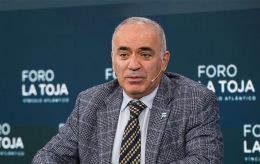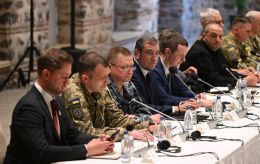Kristi Raik: Once the war is over, divisions on how Europe sees Russia will appear
 Photo: Kristi Raik, Deputy Director and Head of the Foreign Policy Program of the International Center for Defense and Security (ICDS)
Photo: Kristi Raik, Deputy Director and Head of the Foreign Policy Program of the International Center for Defense and Security (ICDS)
The war in Ukraine has left the Baltic countries with no choice but to stand on the side of Ukraine, as Russia often poses a threat to them as well. In an interview with RBC-Ukraine, Kristi Raik, the Deputy Director and Head of the Foreign Policy Program of the International Center for Defense and Security, discussed what is happening in Europe, the plans of the Russians, and the possibility of revolution in Russia.
About war tiredness and assistance to Ukraine
Kristi Raik notes that there is no tiredness among Ukraine's allies as such. There are discussions both in the EU and the USA, but they do not relate to war tiredness. However, in the European Union, there are so-called cracks in European unity observed. For example, Hungarian Prime Minister Viktor Orban periodically tries to resist decision-making.
"The US (US support - ed.) is the most critical question, of course. And it's kind of coming from the margins of the US political scene, but still, we can see that the political forces in the US that are questioning the continuing support to Ukraine, are getting more visible and it's becoming more difficult to maintain support," Raik noted.
However, according to the expert, support for Ukraine will continue until the end of Joe Biden's term. At the same time, Russia expects too much from political changes. Despite various fluctuations, in Raik's opinion, the West will continue to help Ukraine, including the USA, even if Donald Trump wins the elections. He will not want to repeat his predecessor's experience with Afghanistan, Kristi Raik believes.
"Of course, there is constantly this problem with the Western support to Ukraine, that it's significant, it's kind of enough to keep Ukraine going, but it's not sufficient to help Ukraine win the war. This is where we are still, and there have been so many delays with the decisions on different types of arms deliveries. And there is always something where the Western countries are hesitant and they fear that, oh, if we do this, it might be too escalatory. But can it be more? From our point of view, being neighbors of Russia, we see that Russia is putting all of its force to just gain control over Ukraine," Raik added.
The expert noted that attitudes toward Ukraine were indeed different before. When the war began, people in the West felt a moral duty to help Ukrainians win. But today, they are questioning whether to continue support solely for moral reasons. Baltic countries, meanwhile, initially looked at the situation objectively and were not guided solely by morality. For countries geographically close to Russia, it is obvious that it is an aggressor country that will not stop at Ukraine if it realizes its plans.
"Let's imagine what if Ukraine loses and Russia achieves even a partial victory, we know what the Russian goals are, to revise the European security order and to impose its sphere of influence on as big a territory as it can, and Russia would certainly be a bigger threat for NATO, for all of its neighbors, if it wins in Ukraine," the expert stated.
About delays in weapon deliveries to Ukraine
Kristi Raik notes that the West fears Russia's escalation if it more actively supports Ukraine. This fear dates back to the Cold War. At the same time, neighboring countries of Russia, relying on their experience, note that Russia is provoked by weakness, not a strong response.
"If Russia is allowed to go further, it will go further. And it doesn't make any sense to speak about a kind of fear of escalation. If they feel in the future that NATO is so weak that Russia might have a chance to seriously undermine NATO and maybe even attack some of the NATO countries, it will do it if it assesses that NATO is too weak," Raik noted.
The talk of escalation was also present during the NATO summit in Vilnius. Alliance members feared that their positive decision regarding Ukraine could affect Russian sentiments and lead to escalation. At the same time, by supplying Ukraine with more heavy weaponry, allies are convinced each time that there is no escalation from Russia. Gradually, they are learning that Russia will not respond to a powerful decision, but the learning process prolongs the war.
Another reason Ukraine is not provided with enough weapons is that European countries simply lack production capacity.
"We see how difficult it is for Europeans to provide ammunition to Ukraine. We had this initiative of one million shells to Ukraine during one year. It was the Estonian initiative. But now half a year has passed already, and I think about one-third of these shells have so far been provided. And Europe is really struggling to get to the one million because there is not enough production," the expert noted.
Another reason for delivery delays may be that Ukraine's allies cannot anticipate what will happen to Russia in case of its defeat in the war. According to Raik, it is easier for them to have a weaker and more fragmented Russia at their borders than a country that constantly threatens the sovereignty of its neighbors.
"If Russia is in domestic chaos, it's kind of something we are likely to manage much better than having Russia that is kind of really pursuing its imperialistic ambitions in the neighborhood. And moreover, it's really unlikely that Russia will actually fall into pieces. This kind of strong narrative, and I think Ukrainians also like to discuss it, that we'll Russia... And then the effect that this narrative has in the West is that ‘Oh, no, no, we should avoid that.’ This is like a threatening scenario," Raik noted.
However, Raik is convinced that the collapse of Russia will not happen, at least in the foreseeable future. There are no autonomous regions in Russia, and the entire system is centralized and controlled by Moscow. Exceptions include the Caucasus regions, Yakutia, and so on, but they lack strong public will to separate.
If this happens, there will be European politicians willing to improve relations with Russia, which means that opinions within the European Union will diverge.
About the misunderstanding of Russian mentality
The misunderstanding of what a Russian is like is a key problem in Western-Russian relations, according to Kristi Raik. She reminded that in the 1990s, there was a period when Russia tried to move towards democracy but quickly returned to tyranny, which, for Russians, is a kind of historical path.
In the West, it was once believed that development was important for Russia, so it was necessary to build trade and economic relations with Moscow, which would later be valuable for Russians. However, the development within the country is not very interesting to the Russian government. Their main interest is geopolitical, and if they have to endure various costs, they will endure them.
For the same reason, the West turned a blind eye when Russia went to war with neighboring states – Chechnya, Moldova, Georgia, and Ukraine. At the same time, Russian dictator Vladimir Putin did not hide that he did not consider Ukraine a country at all.
Now, in Europe, there is an awareness that becoming dependent on Russian energy resources was a mistake.
About Russia's key goal and Putin's support
According to the expert, Russia's key goal is to return NATO to the position of 1997, meaning almost all Eastern European countries should leave the Alliance. Thus, Russia hopes to restore its sphere of influence.
"When you look at the Cold War division of Europe, Russia controlled such a huge part of Central and Eastern Europe, and it's still kind of having these dreams that it might get it back. The Tsarist Empire controlled huge territories in Europe, so Putin has been making references to Peter the Great, and making it like some hero of Russian history who expanded the empire. He clearly has the same kind of ambitions to expand the empire and kind of take back the Russian lands," Raik noted.
At the same time, if Russia does not achieve its goals, the country's leadership can easily convince Russians that they have achieved their objectives and protected the country from the "fascist Ukraine."
Russia does see a threat in NATO, but it understands that the Alliance will not attack Russia. The threat lies in the fact that NATO, according to Russia, claims their former spheres of influence. This concerns the Baltic countries, Poland, and Ukraine. Russia itself aims to develop exclusively in an imperial way, i.e., by expanding its territory.
In Russia, a coup is unlikely today, but Russia represents a "totalitarian system on clay feet," meaning that the collapse can happen quickly and unexpectedly.
"What this whole Prigozhin story showed in the summer was that the system is actually weak, it's really kind of rotten and then Putin kind of showed himself as a strong man and then got rid of Prigozhin and it was a warning sign, of course, to everybody else who might think of challenging the regime, even if Putin, Prigozhin was not even personally challenging Putin, but of course it was a challenge to Putin. So for the time being, things are kind of under control. But yeah, it's very unpredictable."
Today in Russia, people support Putin. They supported him whenever Russia invaded another state. The main explanation for this phenomenon is imperial thinking.
"Nothing has changed. When I read it for the first time when it came out in the early 2000s, then I somehow read it more like a story about this kind of Soviet, Homo Sovieticus, it was like a thing of the past, but now I read it more like I recognize that this is the mindset still today. Russia is a great power and it has to be a great power and it has to have control over its smaller neighbors. Russia doesn't see the neighboring countries as kind of equally sovereign countries and never has," Raik said.
About the future of Ukraine
Today, Ukraine's allies still assert that Ukrainians will decide for themselves how long the war will continue and where they will stop. However, according to Raik, this is not entirely accurate as the progress of the Ukrainian Armed Forces depends directly on the level of Western support.
"We know that the Ukrainians want to continue fighting. That's another question then for how long the Ukrainians will actually be able to carry on. There are also big losses (on the Ukrainian side - ed.).You have the goal - Ukraine's territorial integrity has to be restored. But we also, of course, realize that in the end, this might not happen. We have to acknowledge that it might not be possible and then we would be in a situation where Russia would continue to occupy part of the Ukrainian territory for a long time. Then in that case I think that must never be legitimized," the expert noted.
Kristi Raik cited Estonia as an example, which, for half a century as part of the USSR, spoke of it as an occupation. Germany, having split into two "states," did not recognize this rupture. Nevertheless, historical moments occurred when Estonia came out from under Russia's control, and Germany reunified. This scenario could also apply to Ukraine in the long term.
"Of course, it would be much better to liberate all the territories next year, but if that won't happen I think we also need to somehow mentally get prepared for this option. And in that case, I think it would be really important to find a way to still move on with Ukraine's integration to NATO and to the EU and to find a way to kind of go ahead even with having this kind of divided country scenario. But that's kind of the future," Raik added.
As for the threats from Russia to Estonia, they are obvious. If Russia wins, it can organize a revisionist mission and go further, threatening the United States. Therefore, today it is necessary to work on strengthening the defense capabilities of the entire West as a whole.

